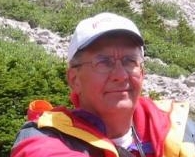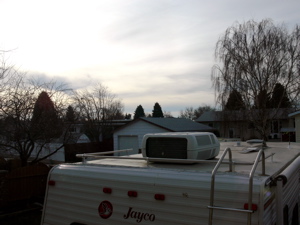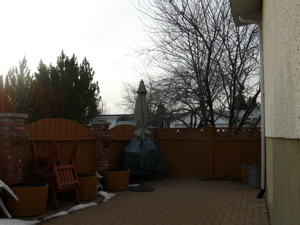Saturday December 9, 2006 8:35 am Lethbridge Sunrise 8:16 Sunset 16:31 Hours of daylight: 8:15
A. Morning Musings
8:35 am It is -3 C at the moment with a high of +9 C forecast.
|
|
From rear window |
South patio |
Both images taken at 2:10 PM |
B. Plan
| Immediate |
|
|
| Health |
Walk & exercise |
1 hr |
| History |
Make notes for "Citizens" |
1 hr |
| |
Read Watson "Ideas" |
1 hr |
| Philosophy |
Read & make notes for "Breaking the Spell" |
2 hr |
| GO |
Complete reading "Lessons in the Fundamentals of Go" Volume 1 |
1 hr |
| Literature |
Continue reading "Virginia Woolfe: The Inner Life" by Julia Briggs |
1 hr |
| |
Begin reading "Selected Works of Virginia Woolf" - Jacob's Room |
1 hr |
| Model Trains |
Continue assembly of coaling tower |
1 hr |
| Later |
|
|
| Chores |
Investigate water softeners for home |
|
| Technology |
Read manual for cell phone |
|
| |
Make notes for chap. 4 of "Switching to the Mac" |
|
| |
Begin reading "iPhoto" |
|
| |
digital photography - learn about using the various manual settings |
|
| Philosophy |
Read "The Art of Living" by Epictetus |
|
| Mathematics |
Read "Fearless Symmetry" chap 9: Elliptic Curves |
|
| |
Make notes on the beginnings of number theory |
|
| |
Larson "Calculus" |
|
| |
Read "Symmetry" by Hermann Weyl |
|
| |
Read "The Computational Beauty of Nature" Chap
3 |
|
| |
Gardner "The Colossal Book of Short Puzzles" |
|
| Model Trains |
Build oil refinery diorama: add ground cover |
|
| |
Assemble second oil platform kit |
|
| |
Assembly of CN 5930, an SD40-2 with a NAFTA logo |
|
| Puzzles |
The Orange Puzzle Cube: puzzle #9 |
|
C. Actual/Notes
|
|
|
Philosophy Chronology |
Notes for "Breaking the Spell" (2006) by Daniel Dennett
9:30 am
I have read the first 3 chapters of this book and am going to try to make a few notes. |
Chapter One Breaking Which Spell? [p. 3 - 28]
- "We often find human beings setting aside their personal interests, their health, their chances to have children, and devoting their entire lives to furthering the interests of an idea that has lodged in their brains." [p. 4]
- "Muslims ... Christians, Jews, ..., Sikhs, Hindus and Buddhists, ... And don't forget the many thousands of secular humanists who have given their lives for Democracy, or Justice, or just plain Truth. There are many ideas to die for." [p. 4]
- "We have ... the ability to transcend our genetic imperatives. ... How did just one species, Homo sapiens, come to have these extraordinary perspectives on their own lives?" [p. 4]
| While I agree that we are the only species with the ability to reflect on our actions, I am not sure I agree with the statement that we have the ability to transcend our genetic imperatives. Our ability to think and reflect on that thinking is part of our genetic imperative. We cannot stop ourselves from thinking. |
- "What are the ancestors of the domesticated ideas that spread today? ... The great ideas of religion have been holding us human beings enthralled for thousands of years, longer than recorded history but still just a brief moment in biological time." [p. 6]
| The first seven chapters attempt to address this question and the last three chapters then look at religion as it is practiced today. |
- "... what we usually call religions are composed of a variety of quite different phenomena, arising from different circumstances and having different implications, forming a loose family of phenomena ..." [p. 7]
| Philosophy has a tendency to want to define its terms, but at least Dennett recognizes the fuzziness of the attempt. Here is his definition of religion. |
- "Religions ... as social systems whose participants avow belief in a supernatural agent or agents whose approval is to be sought." [p. 9]
- "The core phenomenon of religion, I am proposing, invokes gods who are effective agents in real time, and who play a central role in the way participants think about what they ought to do." [p. 11-12]
Dennet clarifies his definition by noting that the agent(s) or god need not be anthropormorphic although many people do use such language as God will answer their prayers, or God created the universe and God have mercy.
He also notes that there are people who do not join a group and have individual private religious experiences. He views such people as spiritual but not religious. |
- "The problem is that there are good spells and then there are bad spells. ... Religious cults and political fanatics are not the only casters of evil spells today. Think of the people who are addicted to drugs, or gambling, or alcohol, or child pornography. ... Perhaps, while we are at it, we should enquire whether the world would be a better place if we could snap our fingers and cure the workaholics, too - but now I am entering controversial waters." [p. 13]
- "... we others have no right to intrude on their private practices so long as we can be quite sure that they are not injuring others. But it is getting harder and harder to be sure about when this is the case." [p. 13 - 14]
- "People make themselves dependent upon many things. Some think they cannot live without daily newspapers and a free press, whereas others think they cannot live without cigarettes. Some think a life without music would not be worth living, and others think a life without religion would not be worth living. Are these addictions? Or are these genuine needs that we should strive to preserve, at almost any cost?" [p. 14]
- "For many people, probably a majority of the people on Earth, nothing matters more than religion. For this very reason, it is imperative that we learn as much as we can about it. That, in a nutshell, is the argument of this book." [p. 15]
- "Wouldn't such an exhaustive and invasive examination damage the phenomenon itself? Mightn't it break the spell? That is a good question, and I don't know the answer. Nobody knows the answer. That is why I raise the question, to explore it carefully now, so that we (1) don't rush headlong into inquiries we would all be much better off not undertaking, and yet (2) don't hide facts from ourselves that could guide us to better lives for all." [p. 15]
Yet two pages later Dennett says, "The spell that I say must be broken is the taboo against a forthright, scientific, no-holds-barred investigation of religion as one natural phenomenon among many."
He appears to brush aside his first point that we "don't rush headlong into inquiries we would all be much better off not undertaking.
I am also a little bothered by his use of the term scientific. In this context, what constitutes a scientific investigation? I assume it means a recourse to empirical data, yet I am not sure what would constitute data. Also I am not sure what would constitute a theory in this setting. The scientific method has, as one of its tenants, that a theory must be able to be disconfirmed. What exactly is it that is to be disconfirmed? |
- "Indeed, many people think that the best hope for humankind is that we can bring together all of the religions of the world in a mutually respectful conversation and ultimate agreement on how to treat one another. They may be right, but they don't know. ... just as many people believe that world peace is less important, in both the short run and the long, than the global triumph of their particular religion over its competition. Some see religion as the best hope for peace, a lifeboat that we dare not rock lest we overturn it and all of us perish, and others see religious self-identification as the main source of conflict and violence in the world, and believe just as fervently that religious conviction is a terrible substitute for calm, informed reasoning. Good intentions pave both roads." [p. 16]
- " 'Philosophy is questions that may never be answered. Religion is answers that may never be questioned.' Anonymous. " [p. 17]
SUMMARY of the session: A stimulating beginning. The second chapter appears to address my concerns about the nature of a scientific investigation of religion, but I will need to reread it more carefully, and make some notes, before I decide if I agree with Dennett.
The making of these notes is an important component, for me, of actually reading the book carefully. Reading is more than simply rapid eye movement. The point is not to read, but to think, and thinking involves a variety of processes. It is these processes that are important, not the actual artifact (i.e. the notes). 11:20 am
|
|
D. Reflection |



